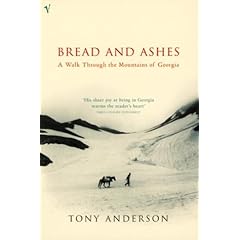The great pleasure in such journeys is in seeing and feeling what no map can tell, no matter for how long poured over in the quiet of a room at home or in the basement of the Royal Geographical Society. Of course, the romance of maps lies in their mystery, in the names of far-off places in strange tongues, such a powerful seduction: Ilisu, Shatili, Ushguli, Batumi, Tbilisi, Baku. I have sometimes imagined a turbanned man of my age sitting cross-legged on the floor of his dwelling in Samarkand wit a map of Britain open in front of him, mouthing gently to himself, while a small shiver of pleasure descends his spine, 'Saffron Walden, Gateshead, Chipping Sodbury, Clacton-on-Sea.- Tony Anderson, Bread and Ashes: A Walk Through the Mountains of Georgia

I've reread this passage a number of times since my trip to Georgia this summer and better felt its sentiment each time; perhaps alone for the number of times I have poured over maps of far away places, planning extensive overland journeys for which I have not the time nor the resources, purely for flirtation with rising wanderlust. But this passage also reminds me of the feeling you get when finally arriving someplace you've long thought about, and how naturally you can fall into the pace of things, feeling that the far away place is not so far away at all. And perhaps most of all the reminder of what a privilege it is to choose a spot on a map and decide to see it for yourself.
 -Trinity Church in Gergeti (Kazbegi) - perhaps one of the most famous sites in Georgia. Photograph once again courtesy of David, Clicking Again's favourite photographer
-Trinity Church in Gergeti (Kazbegi) - perhaps one of the most famous sites in Georgia. Photograph once again courtesy of David, Clicking Again's favourite photographerThis summer in Kazbegi, one of the most famous tourist destinations in Georgia and a beautiful mountain region, I met two American brothers (from Michigan, no less) and an Australian around-the-worlder at my homestay. I mentioned to them the small box in my Georgia Lonely Planet describing a hike over the Juta Pass, into another mountain region that is not accessible without going back through Tbilisi. The brothers had already caught wind of it and were in. A Czech couple overheard and joined the conversation, producing a topographic map they had found and printed up of the pass. We stayed up late pouring over it, improvising water-proof gators and organizing transportation to the foot of the pass.
The next day the sky was gray, and reports of a washed out road on the way to Juta squashed our hastily made plans. The Americans had to move on, the Czechs as well. Alex (the Australian) and I had a bit more time and made plans for the next day.
The next morning our homestay drove us to where the road had washed out, and we were picked up on the other side by someone who would show us the path to the Pass.

Even after spending the last week hiking in Mestia, I was not in the kind of shape I should have been to go over the pass. Yes, I got over it in the end, but if anyone had been keeping score, Juta would have certainly won regardless. Although it was June the pass was still covered with snow, and the trail was often washed out or nonexistent. The fact that I took few pictures of the breathtaking view is good indication of how scared (near to death) I was. There I am bundled up next to the cairn, and there's Alex eating a well deserved Snickers. Behind him is the side we had just climbed up.


The descent was gorgeous, but not much easier. When we reached the cow line, we knew the end was near.

And of course the village of Roschka was the most welcome sight I had ever seen.

A few days later, I reached the chapter on the Juta pass in Tony Anderson's Bread and Ashes. I carried that book up and down the pass without realizing that the cover of his book is a picture of the very same place.

Writing this post now, and reading again at these far away names on the map - Ilisu, Shatili, Ushguli, Batumi, Tbilisi, Baku - I look forward to hiking through these mountains again soon. With that in mind, perhaps I should go for a run.
No comments:
Post a Comment